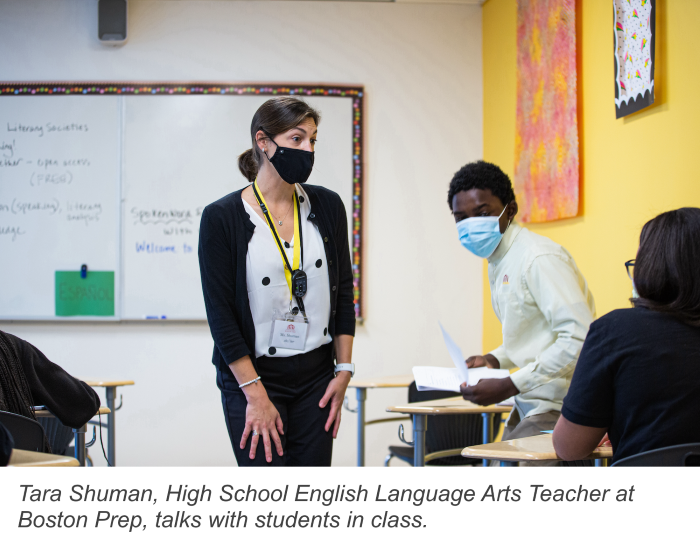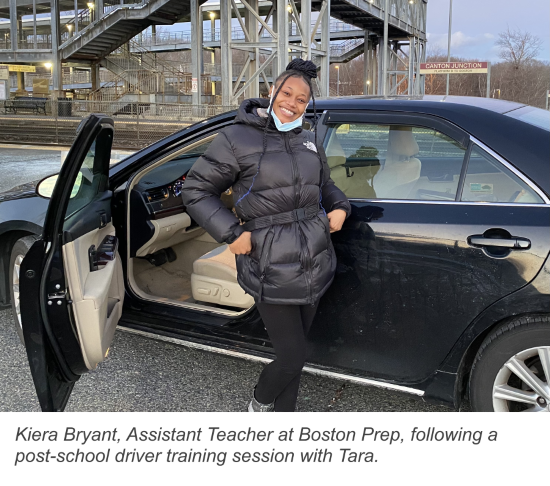“How’s school?” friends and family ask. I give my typical response, “Always interesting!” But the truth? School, right now, is beautiful, heartbreaking, fulfilling, exhausting, predictable, unpredictable, disheartening, inspiring, messy, and marvelous.
This fall, as I anticipated, finally, a “normal” year, I filled my walls with quotes that would bring life and color to my classroom again. I even ordered a brand new poster of the Maya Angelou quote I cherish more than any other: “People will forget what you said. People will forget what you did, but people will never forget how you made them feel.”
Indeed, I have already started to forget some of what has been said and done throughout these most bizarre and challenging years of pandemic teaching. (Hybrid learning? Much of it is a blur now.) But somehow, through it all, I can remember so much of how I’ve felt. I’d imagine many colleagues and students would agree.
At Boston Prep, we often ask our students how they feel. The most common answer? Tired. Some of my students are tired because they work jobs with long, late shifts to help support their families. They are tired because, all too often, they wake up to news that this world is not safe for them because of the color of their skin. They are tired because of homework and sports and college essays. They are tired because they have seen loved ones grind out long days for minimal pay. On top of it all, many students have been sick, most have been scared, and all too many have seen loved ones battle COVID-19 in the most courageous yet tragic of ways.
 I can’t take away all of these challenges. What I’ve learned I can do, though, is ensure that in addition to feeling tired, my students also feel loved, heard, and supported. Now, instead of getting frustrated when a student puts their head down on the desk, I ask, “Did you work a late shift last night?” Whereas in the past I might have raised my voice when speaking to a student who was raising their voice with me, I have learned to breathe, find calm, and search for the right time to ask, “Are you doing okay? How can we support you?” I can’t take away all of these challenges. What I’ve learned I can do, though, is ensure that in addition to feeling tired, my students also feel loved, heard, and supported. Now, instead of getting frustrated when a student puts their head down on the desk, I ask, “Did you work a late shift last night?” Whereas in the past I might have raised my voice when speaking to a student who was raising their voice with me, I have learned to breathe, find calm, and search for the right time to ask, “Are you doing okay? How can we support you?”
Our students want to do well and they want to do good; in order to do so, they need the world around them–they need us–to do the same.
Thus emerges yet another significant challenge of teaching in our third pandemic-impacted school year: educators must help students dream, stretch, and excel in the face of exhaustion, despite the fact that we, too, like so many others, are exhausted.
There is no easy or quick solution to the challenges our educators are facing right now, but I have seen, and felt, the power of compassion, patience, selflessness, and most of all, teamwork. The truth is that while the loud and often repeated calls for “self care” are valid, it’s care for and from my colleagues - a deeply invested, supportive team - that has given me the strength and inspiration to continue when I feel too tired to keep going.
Several weeks ago, as I was leaving school after a hard day, I walked by a young colleague who was curled up in a chair. Kiera, one of my former students, had returned to Boston Prep this past fall, joining our team as a teacher’s assistant, excited to give back to her community - even despite a long, expensive commute to Hyde Park from Providence via train, bus, or Uber. As I asked her if she was okay, I saw the tears in her eyes above her mask. She had missed her train. Her Uber had canceled on her twice. Admittedly, I wanted to keep walking, get in my quiet car, and go home. I was tired. But Kiera’s eyes held the same hopelessness I’ve felt so many times, especially over the past two years. “Get up. Let’s go,” I told her, and we headed to my car.
 As we drove away from school, Kiera fought back more tears. Navigating her first year as an educator, in the midst of a pandemic, was hard, and the commute seemed to be the straw that was breaking her back. I asked Kiera why she didn’t learn to drive. “I have my permit, but who’s going to teach me?” I pulled over into a parking lot on Route 138. “Drive, then,” I told her. At first, she laughed, but then, she got behind the wheel, and she did it. Since then, Kiera and I leave school together daily so she can practice driving. As we drove away from school, Kiera fought back more tears. Navigating her first year as an educator, in the midst of a pandemic, was hard, and the commute seemed to be the straw that was breaking her back. I asked Kiera why she didn’t learn to drive. “I have my permit, but who’s going to teach me?” I pulled over into a parking lot on Route 138. “Drive, then,” I told her. At first, she laughed, but then, she got behind the wheel, and she did it. Since then, Kiera and I leave school together daily so she can practice driving.
My time with Kiera makes me a better teacher. She gives me the inspiration I need to remember we can all do hard things.
And I hope our time together makes Kiera not only a better driver but a better teacher, too. Because we need more Kieras in our classrooms - diverse educators whose lived experiences are similar to those of our students; passionate warriors who believe fiercely in equitable access to high quality education; dynamic, caring leaders who inspire our kids to do hard things.
I know one day Kiera will forget the little things I’ve said and done to support her in her first year as an educator. But I believe that she will remember how she has felt, both in and out of the classroom: strong, loved, and hopeful. Ultimately, that’s what I think my students will remember about these most unusual, tiring school years: not a teacher who learned how to whip around Zoom breakout rooms like a teacher-wizard or who figured out that a karaoke machine with a microphone would help project their voices over the loud air purifiers, but a teacher who, even when they were at their most tired, made them feel strong, loved, and hopeful. In the end, for me, that is what teaching is all about. |